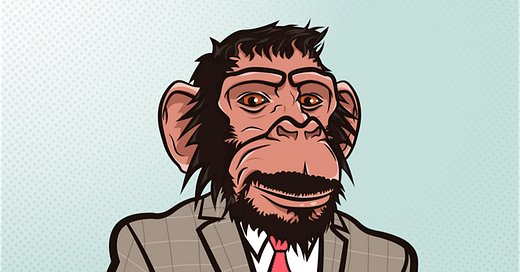#tribaltheory 001: An introduction
Dear reader,
In whom do you put your trust?
This is one of the most ancient dilemmas of life on Earth. Evolution has crafted several answers, yet one solution to the problem is completely unique in humans.
The first answer was simple – trust family.
With the universal success of this solution, behaviors that privileged kin became written in the code of most life on Earth. But evolution didn’t stop there.
The next solution, for brainy enough animals, was – trust friends.
Friendship serves as a kind of natural insurance policy that was as radical as it was innovative. But for most species friendship is nearly impossible because of the brain power, and computational expenses, associated with remembering interactions through space-time. Thus, friendship is bottlenecked by our meager brains. As humans became one of the most successful animals on the planet, we scaled beyond the capacity for face-to-face relationships. Our success came back to haunt us, as we proliferated in droves, we became encroached by strangers. Humanity needed a new answer to the trust question.
The newest answer was – trust tribe.
The evolution of this trait, likely 300,000 years old, resulted in what I call The Tribe Drive. This Substack revolves around this theme and is the compendium to additional content developed during my writing of: OUR TRIBAL FUTURE: How to Channel Our Foundational Human Instincts Into a Force for Good.
Our Tribal Future is the ultimate moral quest to understand how a human mind, that was crafted to work with people we know, evolved the instinct to work with people we don’t. Tribes are a kind of secret society, where the signals of coalitionary alliance serve as the ‘secret password’ to gain the rights, responsibilities, and benefits of the collective “imagined order.” If you pass the test, and you are treated with a positive bias by your fellow members, then you are bestowed with tribal identity and the host of privileges and responsibilities that come with it.
No other species on the planet has this amazing capacity at their disposal. Tragically, it appears embedded in this blessing, of super-scaled cooperation, was a dark and terrible curse. Once there is an ingroup, so too there is an outgroup. And more often that we would ever want, this designation leads to some of the most horrendous of human behaviors.
A deep, scientifically robust understanding of this equally terrific and terrifying adaptation will be critical to the future survival of our species. The science of wellness shows us how critical it is to dwell within an intentional community. We need strong, face-to-face relationships that serve as healthy communities. Yet, beyond the community level, we need to guard against the dangers of outgroup conflict the Tribe Drive can so easily arouse.
Some articles will extend the theory developed in the book. We label these #Tribaltheory. These numerically designated articles will deep dive the science of groupishness. Other articles will delve into the new science of applied evolutionary anthropology to help readers strengthen cohesion in the groups they belong to. We label these #campcrafting. These articles will serve as a blueprint to help you forge cohesion amongst the groups you care about most. The latter articles in particular are intended to serve as a 21st century “how-to guide” for those who want to leverage their coalitionary instincts to build their own modern-day hunter-gatherer camp (intentionally proximate collective living), bands (face-to-face communities), and tribes (beyond face-to-face networks).
This project I simply term #campcrafting. The ultimate aim is to provide an evidence based, step-by-step approach on how to strengthen your social network all while inoculating yourself against the worst of the tribe virus’ symptoms when it goes haywire within and among our societies. Perhaps, with enough herd immunity, humanity stands a better chance in the future against one of the most pernicious and existential threats we face.
With a better understanding of the Tribe Drive, can we use it to help us on the longstanding question of human unification. Can humanity become one meta-tribe?
We’ll explore these topics and more in this newsletter.
Yours sincerely,
David R. Samson





